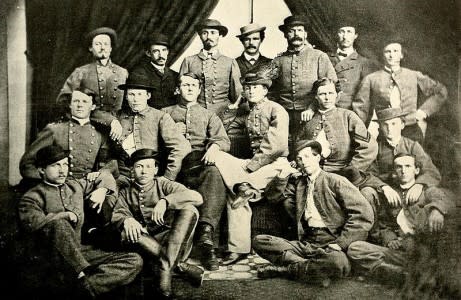Three other big historical events that happened on Christmas Day
December 25 is celebrated in parts of the world as Christmas Day, as a religious holiday (commemorating the birth of Jesus) and a secular holiday. It’s also a big day for other events in American history.
Confederate troops
Globally, December 25 was the day that Charlemagne and William the Conqueror were crowned; opposing sides called a truce in World War I; Mikhail Gorbachev left power in the former Soviet Union; and actors W.C. Fields and Charlie Chaplin passed away.
But here are three pivotal events in U.S. history that happened on December 25th.
Washington Crosses the Delaware (1776)
Washington’s army had been issued a series of defeats in 1776 by British forces and were amassed between Philadelphia and Princeton. As a commander, Washington dealt with several critical problems: his forces were in need of a victory; many troops were at the end of their enlistment; and winter was ready to set in.
It wasn’t just Washington who crossed the Delaware River in a surprise attack; it was a re-energized military force that included John Marshall, Alexander Hamilton, Aaron Burr, and James Monroe. A future president, Monroe was one of two men on the American side who were wounded as Washington’s troops routed a Hessian garrison in Trenton, in a battle the changed the Revolution.
President Andrew Johnson pardons most Confederate soldiers (1868)
This was one of the most controversial actions of Johnson’s rocky presidential term. The former Democrat from Tennessee found himself unexpectedly in the White House after Abraham Lincoln’s death in 1865.
Johnson fought against his own party members, the Radical Republicans, for several years. (Technically, both were in what was called the Union Party for the 1864 election.) And earlier in 1868, he survived trial in the Senate after being impeached by the House.
President Johnson issued a general pardon on Christmas Day in December 1868 for all those who fought for the Confederacy, provided that anyone eligible applied for one.
It was actually Johnson’s fourth amnesty provision for Confederates, and it restored civil and property rights and provided immunity from treason charges. But it didn’t allow former Confederate officials to vote or hold office.
In 1872, the Amnesty Act was amended to allow almost all former Confederates, except for several hundred former high-ranking officials (such as Jefferson Davis), to hold public office and vote.
First Test Run of the Modern Internet (1990)
The Internet in various pieces had existed before 1990, but it was on Christmas Day that it was connected to the first Web browser.
British software consultant Tim Berners-Lee was working at CERN, a physics laboratory in Switzerland that hosted visiting international scientists doing research into particle physics.
At the time, the computers at CERN couldn’t communicate with each other to share information, and Berners-Lee wrote a program over two months that became the first Web browser.
On December 25, 1990, Berners-Lee accessed the first Web page ever built. But it took three years for people to start to understand the World Wide Web’s potential. With the advent of the Netscape browser and America Online, the web took off in popularity in the second half of the 1990s.
Today, the pervasiveness of the modern Internet is a major factor in many constitutional issues, from presidential elections to privacy.



